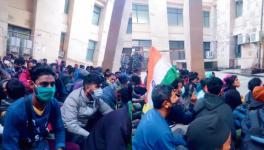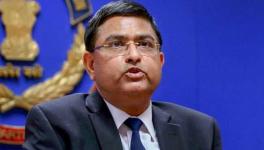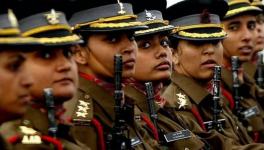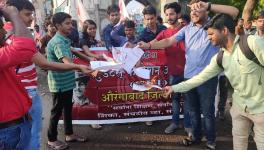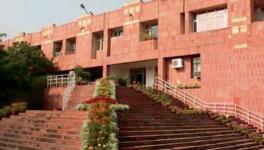What’s the New Law to Prevent ‘Unfair Means’ in Public Exams
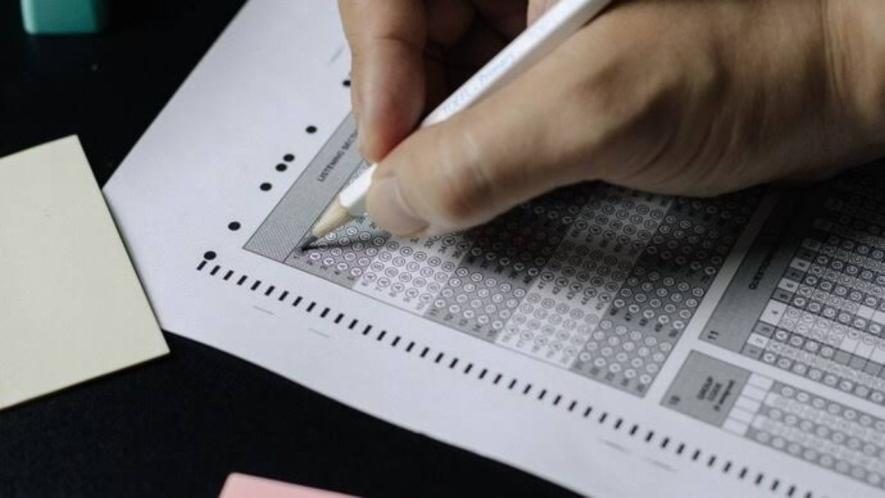
Amidst the allegations that the National Eligibility-cum-Entrance Test (NEET) (Undergraduate) and University Grants Commission-National Eligibility Test (UGC-NET), 2024 have been compromised, the Union government on Friday brought into force the Public Examinations (Prevention of Unfair Means) Act, 2024.
Both the exams were conducted by the National Testing Agency (NTA). It was established as a premier, specialist, autonomous and self-sustaining testing organisation to conduct entrance examinations for admission and fellowship in higher educational institutions.
The Act had received the assent of the President of India on February 12, 2024. However, the government brought it into force only on Friday.
The Act had received the assent of the President of India on February 12, 2024. However, the government brought it into force only on Friday.
The Act was passed after taking into consideration the malpractices in public examinations leading to delays and cancellation of examinations adversely impacting the prospects of millions of youth.
Section 2(k) of the Act defines “public examination” to mean any examination conducted by a public examination authority as specified in the Schedule or conducted by such other authority as may be notified by the Union government.
At present, examinations conducted by the Union Public Service Commission (UPSC), the Staff Selection Commission (SCC), the Railway Recruitment Boards (RRB), the Institute of Banking Personnel Selection (IBPS), ministries or departments of the Union government and their attached and subordinate offices for recruitment of staff, the National Testing Agency (NTA), and such other authority as may be notified by the Union government, are the subject matter of this Act.
The Act introduces a substantive offence of “unfair practice” which is punishable with imprisonment of a term not less than three years but which may extend to five years and with a fine of up to ₹10 lakh.
Since the law creates a substantive new offence, it will only be applicable prospectively to comply with Article 20(1) of the Constitution of India. This means that cases of alleged irregularities in UGC-NET and NEET already done cannot be prosecuted under the new Act.
Section 2(n) defines “service provider” to mean any agency, organisation, body, association of persons, business entity, company, partnership or single proprietorship firm, including its associates, sub-contractors and provider of support of any computer resource or any material, by whatever name it may be called, which is engaged by the public examination authority for the conduct of the public examination.
A service provider guilty of unfair practice will also be liable to be punished with the imposition of a fine of up to ₹1 crore and a proportionate cost of the examination will also be recovered from such service provider.
The Act introduces a substantive offence of “unfair practice” which is punishable with imprisonment of a term not less than three years but which may extend to five years and with a fine of up to ₹10 lakh.
In addition, guilty service providers will also be barred from being assigned any responsibility for the conduct of any public examination for four years.
Section 3 of the Act lists several acts which will qualify as “unfair means” relating to the conduct of a public examination. They are:
- Leakage of question paper or answer key or part thereof.
- Participating in collusion with others to effect leakage of question paper or answer key.
- Accessing or taking possession of question paper or an Optical Mark Recognition (OMR) response sheet without authority.
- Providing solution to one or more questions by any unauthorised person during a public examination.
- Directly or indirectly assisting the candidate in any manner unauthorisedly in the public examination.
- Tampering with answer sheets including the OMR response sheets.
- Altering the assessment except to correct a bona fide error without any authority.
- Willful violation of norms or standards set up by the Union government for the conduct of a public examination on its own or through its agency.
- Tampering with any document necessary for short-listing candidates or finalising the merit or rank of a candidate in a public examination.
- Deliberate violation of security measures to facilitate unfair means in the conduct of a public examination.
- Tampering with the computer network or a computer resource or a computer system.
- Manipulation in seating arrangements, and allocation of dates and shifts for the candidates to facilitate adopting unfair means in examinations.
- Threatening the life, liberty or wrongfully restraining persons associated with the public examination authority or the service provider or any authorised agency of the government; or obstructing the conduct of a public examination.
- Creation of fake websites to cheat or for monetary gain.
- Conduct of fake examinations, issuance of fake admit cards or offer letters to cheat or for monetary gain.
Section 8 provides that any person, including the person associated with a service provider, will be deemed to have committed an offence if he individually or in collusion with any other person or group of persons or institutions assists any person or group of persons or institutions in any manner unauthorisedly in the conduct of the public examination.
In addition, the service provider or any person associated with it shall be deemed to have committed an offence if he fails to report an incidence of any unfair means or commission of any offence.
A service provider guilty of unfair practice will also be liable to be punished with the imposition of a fine of up to ₹1 crore and a proportionate cost of the examination will also be recovered from such service provider.
Section 2(h) defines “organised crime” to mean an unlawful activity committed by a person or a group of persons indulging in unfair means in collusion and conspiracy to pursue or promote a shared interest for wrongful gain in respect of a public examination.
Section 11 of the Act provides the punishment for doing “organised crime” which is imprisonment for a term not less than five years but which may extend to ten years, along with fine which shall not be less than ₹1 crore.
If an institution is involved in committing an organised crime, its property will be subjected to attachment and forfeiture and the proportionate cost of the examination shall also be recovered from it.
Importantly, Section 12 mandates that an officer not below the rank of deputy superintendent of police or assistant commissioner of police will only be the officer who can investigate any offence under this Act.
Clause 2 of Section 12 confers power upon the Union government to refer the investigation to any Union-level investigating agency.
All offences under the Act are cognisable, non-bailable and non-compoundable.
The notification giving effect to the Act has come amid controversies surrounding the NEET and UGC-NET examinations.
On June 19, the Union ministry of education decided to cancel the UGC-NET June 2024 examination in OMR (pen and paper) mode held on June 18 after it received certain inputs from the National Cyber Crime Threat Analytics Unit of Indian Cyber Crime Coordination Centre (I4C) under the ministry of home affairs on the examination.
These inputs prima facie indicated that the integrity of the aforesaid examination may have been compromised. The UGC-NET was conducted by the NTA.
Faced with the protests by aggrieved students, the NTA later decided to cancel the scorecards of the affected 1,563 candidates who were given grace marks.
Regarding NEET-undergraduate or UG 2024, the government said certain irregularities were alleged in the conduct of the examination in Patna on which a detailed report had been sought from the economic offences unit of the Bihar police.
The education ministry said it would take further action regarding NEET-UG 2024 on the receipt of a report from Bihar police.
Nearly 24 lakh students appeared for the NEET-UG 2024 for undergraduate medical courses. The exam was conducted on May 5. The result was announced on June 4, that is, ten days before schedule. Since then, reports and allegations have surfaced ranging from paper leaks to the grace marks being given to candidates inappropriately.
Petitions were filed in the Supreme Court challenging the grant of compensatory marks to 1,563 candidates by using a normalisation formula where the candidates who had appeared at some of the examination centres were not allowed to utilise the full three hours and 20 minutes but were granted lesser time.
The compensatory marks were awarded based on recommendations of the grievance redressal committee constituted by the NTA.
Faced with the protests by aggrieved students, the NTA later decided to cancel the scorecards of the affected 1,563 candidates who were given grace marks.
It suggested that a new test will be held for the affected 1,563 candidates and the result of those affected 1,563 candidates who do not wish to appear for the new test will be declared based on their actual marks (without adding compensatory marks) obtained by them.
These suggestions were accepted by the Supreme Court on May 13. The issue of examination having been compromised is still pending before the Supreme Court which is likely to be heard on July 8.
However, the controversy surrounding the NEET and the conduct of the NTA refuses to die down. As per a report by the Indian Express, one of the people suspected of being behind an alleged question paper leak told the Bihar police that four aspirants had gathered at a location chosen by him a night before the exam and “memorised answers” of questions from the paper.
Speaking to the media, Union education minister Dharmendra Pradhan said he would order the setting up of a high-level committee aimed at re-examining the functioning of the NTA.
Amidst the allegation, on Saturday, the government also removed the incumbent director general of the NTA, Subodh Kumar Singh, and appointed Pradeep Singh Kharola as the new director general of the agency.
Get the latest reports & analysis with people's perspective on Protests, movements & deep analytical videos, discussions of the current affairs in your Telegram app. Subscribe to NewsClick's Telegram channel & get Real-Time updates on stories, as they get published on our website.














